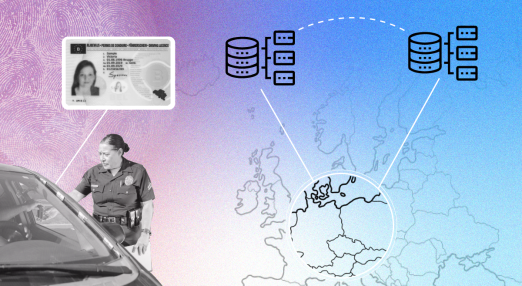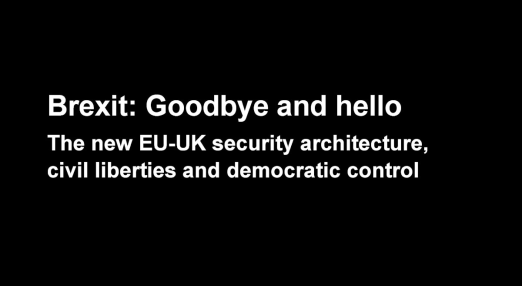Advocate General recklessly calls for watering down privacy protections
On 27 October, the Advocate General (AG) Szpunar of the Court of Justice of the European Union (CJEU) released his opinion on the French ‘HADOPI’ system against online copyright infringements. The case has potentially important implications for the ongoing political debate on data retention by private companies for access by law enforcement authorities.
Filter resources
-

Advocate General recklessly calls for watering down privacy protections
On 27 October, the Advocate General (AG) Szpunar of the Court of Justice of the European Union (CJEU) released his opinion on the French ‘HADOPI’ system against online copyright infringements. The case has potentially important implications for the ongoing political debate on data retention by private companies for access by law enforcement authorities.
Read more
-

Position Paper: New EU law amplifies risks of state over-reach and mass surveillance
The EDRi network published its position paper on the proposed Regulation on automated data exchange for police cooperation (“Prüm II”). The European Commission’s Prüm II proposal fails to put in place vital safeguards designed to protect all of us from state overreach and authoritarian mass surveillance practices. In the worst case scenario, we may no longer be able to walk freely on our streets as the new law would treat large parts of the population as a criminal before proven otherwise.
Read more
-

Policing: Council of the European Union close to approving position on extended biometric data-sharing network
The Council of the European Union is close to reaching an agreement on its negotiating position on the 'Prüm II' Regulation, which would extend an existing police biometric data-sharing network to include facial images and offer the possibility for national authorities to open up their databases of "police records" for searches by other member states.
Read more
-

“E-evidence” negotiations: European Parliament must stand its grounds
The European Parliament and the Council have tremendous difficulties to agree on the issue of cross-border access to data by national law enforcement authorities. While the Parliament is trying to maintain as many fundamental rights safeguards as possible in the so-called “e-evidence” Regulation, the Council is stubbornly sticking to its position. If the Council’s vision overrides the Parliament, the legislation would seriously threaten free speech, privacy rights and the right to a fair trial. A coalition of digital rights, lawyers, journalists, media organisations and internet service providers associations are calling on the Council to show a greater spirit of cooperation and urge the Parliament to not excessively deviate from its original position.
Read more
-

Policing: France proposes massive EU-wide DNA sweep, automated exchange of facial images
The French Presidency of the Council is seeking EU-wide comparisons of every DNA profile held by police forces against all those held by other national police forces, as well as EU policing agency Europol, as part of plans to upgrade the ‘Prüm’ network of police databases. It also hopes to automate the police exchange of facial images by eliminating requirements for human review.
Read more
-

New Cybercrime Protocol will undermine our privacy to compensate for the rising powers of law enforcement authorities
This new international agreement raises serious concerns as its shortcomings promise to undermine the safeguards to our fundamental rights, including our privacy and procedural rights.
Read more
-

UK can join EU surveillance schemes with no parliamentary scrutiny, warns new report
The UK can join intrusive EU surveillance schemes including a pan-European network of police facial recognition databases with no need for parliamentary debate or scrutiny, says a new report published by EDRi member Statewatch.
Read more
-

Cross-border access to user data by law enforcement in 2021: A year in review
Law enforcement agencies around the world are getting their holiday wish list, thanks to the Council of Europe’s adoption of a flawed new protocol to the Budapest Convention, a treaty governing procedures for accessing digital evidence across borders in criminal investigations.
Read more
-

Austrian DSB: EU-US data transfers to Google Analytics illegal
In a groundbreaking decision, the Austrian Data Protection Authority ("Datenschutzbehörde" or "DSB") has decided on a model case by noyb that the continuous use of Google Analytics violates the GDPR.
Read more
-

EDPS sanctions the European Parliament for illegal EU-US data transfers – among other violations
In January 2021, noyb filed a complaint against the European Parliament on behalf of six Members of the European Parliament over an internal corona testing website. The issues raised were deceptive cookie banners, vague and unclear data protection notices, and the illegal transfer of data to the US.
Read more
-

E-evidence regulation: Why it matters for medical confidentiality?
Access to health data by foreign authorities in the context of a criminal investigation – be it intentional or not – needs to be carefully regulated as it also impacts doctors’ legal and ethical duties.
Read more
-

Nearly 130 public interest organisations and experts urge the United Nations to include human rights safeguards in proposed UN Cybercrime Treaty
Today, EDRi, our member Electronic Frontier Foundation (EFF), and Human Rights Watch, along with nearly 130 organizations and academics working in 56 countries, regions, or globally, urged members of the Ad Hoc Committee responsible for drafting a potential United Nations Cybercrime Treaty to ensure human rights protections are embedded in the final product. The first session of the Ad Hoc Committee will begin on January 17th.
Read more
